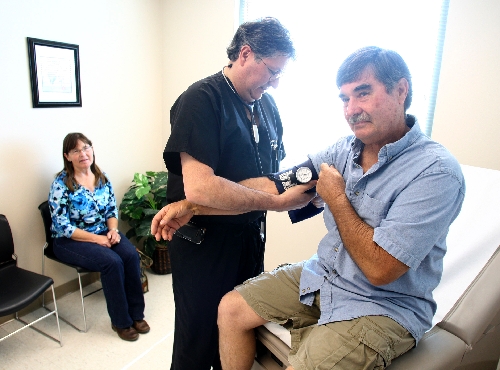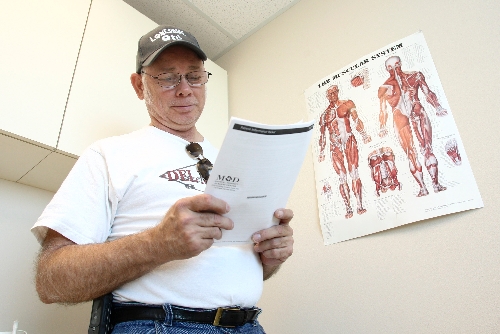Quick care? Pay cash
As Congress passed legislation last week ensuring that health insurance coverage is the right of every U.S. citizen, Las Vegas Dr. Kevin C. Petersen did what he has done for the past two years -- performed surgeries that range from gallbladder removal to hernia repair on a cash-only basis, largely on patients who don't have insurance.
They come from across the country, the uninsured who have been enticed, say, by his $5,000 total charge for a hernia repair, about a third what they've been quoted by other medical professionals or facilities.
Even when the new legislation takes full effect and everyone has insurance coverage in 2014, Petersen hopes to continue performing outpatient surgery for cash patients or those who pay by credit card.
And he says it's not just because his $2,000 gross profit on a hernia case is about four times more than he would currently be paid by Medicare or an insurance company.
"I started doing no-insurance surgery because I wanted freedom, independence, self-determination and to get back closer to why I originally became a physician," Petersen said Monday as he sat in his Summerlin office.
"No one outside of the profession tells me now how I should be treating a patient," he said. "I don't want the red tape, to have to rush with my patients. I don't want to have to work 100 hours a week to make a decent living. Working this way, I'm able to make on average per case what I made 25 years ago."
If Petersen is able to continue his style of practice, he knows his patient mix will undoubtedly change from those he generally sees now -- the uninsured often desperate to find an affordable way to correct a medical problem -- to the insured with the financial means to get their medical care done quickly outside a legislated system that will provide service much more slowly with 31 million new insured patients.
What we have seen in countries where medical care is guaranteed, Petersen said, is that people judged by authorities to have less serious maladies have to wait their turn to be treated, often months for conditions that can be painful but not life threatening.
"Americans aren't known for their patience," he said.
On Monday, Norman Younghusband and his wife Kathy sat in Petersen's waiting room and recounted how they found the physician.
"We were actually checking how much a hernia repair for Norman would cost in Mexico when Dr. Petersen's name popped up on the Internet," Kathy Younghusband said. "He was so much cheaper than everybody else had quoted in the states and he was only a few hours from our home" in Kingman, Ariz.
When the 59-year-old Younghusband left his last construction job in 2006, he thought he would be able to buy insurance on the open market, but he was denied because of his pre-existing conditions of a hernia and high blood pressure.
Finally, Younghusband said, after the first of the year the hernia became so uncomfortable that he knew he had to get it repaired.
"We were a little nervous at first because Dr. Petersen's price for the uninsured was so much lower than anyone else," Kathy Younghusband said.
But the couple researched the surgeon's background and had a free half-hour consultation with Petersen over the phone. The cost of treatment of the hernia repair included lab work, a pre-operation electrocardiogram, the fee of an anesthesiologist and the rental cost of a surgical center.
So many hospitals want $15,000 to $20,000 for the same service for someone who is uninsured, Kathy Younghusband said.
Petersen said he is able, on behalf of the uninsured, to negotiate fees for anesthesia and an operating facility just like plastic surgeons, who never receive insurance payments for cosmetic procedures. He does not reveal the names of the providers he negotiates with, arguing that such information is proprietary.
Petersen said 25 years ago, before private insurance companies started basically using the Medicare rate as their reimbursement benchmark as well, he would receive about $2,000 for a hernia repair on a privately insured patient. Back then, Petersen said, Medicare already paid physicians what he said was far too little for the procedure, about $800.
"Gradually along the way private insurance started reimbursing about the same as Medicare, which has made physicians increase their volume to just stay in the same (financial) place," he said. "That's why patients have felt so rushed and why physicians are even more worried today when they hear talk that the Medicare rate is going to be cut another 20 percent."
Petersen said many doctors have talked about doing a cash-only business, but few carry it out.
"Marketing can cost you $500 to $1,000 a day," Petersen said.
An accomplished computer programmer, Petersen advertises heavily on the Internet to push people to his Web site at www.noinsurancesurgery.com.
A lot of doctors may say they want to do the same thing, but they're afraid to spend the money on the marketing when they're unsure it will pay dividends.
When Petersen analyzes his $5,000 fee for a hernia repair, he finds that his $2,000 profit comes after $3,000 in expenses that include anesthesia, facility and lab fees, financing fees for patients making monthly payments and marketing costs.
Though he continues to see the insured patients that he had on the books before switching to an all cash practice two years ago, Petersen said he sees 10 new uninsured patients for every one insured. Any new patients who come to him with insurance must pay him just as though they are uninsured, though he says it is possible that their insurance companies may reimburse them for a procedure.
His change to a cash-only business has allowed him to earn nearly $300,000 a year. According to Salary.com, the base salary for a general surgeon in the Summerlin area is about $318,000 a year.
"I only have to do 30 or 40 cases a month instead of 70," Petersen said.
There are other physicians across the country, generally in primary care, who are working much like Petersen. About 1,500 doctors across the country are in a group called SimpleCare, which steers patients to doctors who offer cash discounts.
The No Insurance Club, which is headquartered in Arizona with participating physicians in 13 states, offers prepaid health care plans for an annual fee of $480 for singles and $680 for families. The service covers basic medical services that include a variety of tests, shots and physicals and nearly 20 office visits per year.
Chad Harris, who runs the club, thinks entrepreneurs like Petersen will flourish under the new health care reform law.
He said the Las Vegas surgeon's patients will be those who are too impatient to wait on services as well as individuals who decide to pay the penalty for not having insurance -- which will be nearly $700 by 2016 -- rather than paying much more for yearly insurance.
"There are going to be many niche areas because of this plan," he said.
One of the niche areas, Harris believes, will be nearby "medical tourism."
Harris said he is part of a business venture that will bring a world-class surgical facility to Mexico and just be 30 minutes from Phoenix.
"American surgeons will rotate coming there and they are excited about it," he said. "We saw that Canadians would come to the United States to get something done quickly, and I think Americans will do the same thing. It'll be like being at a resort and cost 70 percent of what it would in the United States."
Harris said the only thing that could hurt entrepreneurs such as Petersen is if the American government decides that cash-only doctors somehow cripple the new system and regulate them out of existence.
Richard E. Ralston, executive director of Americans for Free Choice in Medicine, wouldn't be surprised if cash-only doctors are regulated out of work in what he believes would be a misguided attempt to take away this option under the pretext of fairness.
To Ralston, the future for people like Petersen "looks pretty grim." The government "may say it hurts those who can't afford to do that (go to a cash-only doctor)."
To the Younghusbands, who were back in Kingman on Thursday after Norman Younghusband's successful surgery, their biggest hope is that health reform simplifies care.
"I just wish that everything could be as simple as our dealing with Dr. Petersen," Kathy Younghusband said. "He quoted us a fee and we had the procedure done just like that. And he treated us great. That's the way it should be done."
Contact reporter Paul Harasim at pharasim@reviewjournal.com or 702-387-2908.
On The Web:
www.noinsurancesurgery.com


















